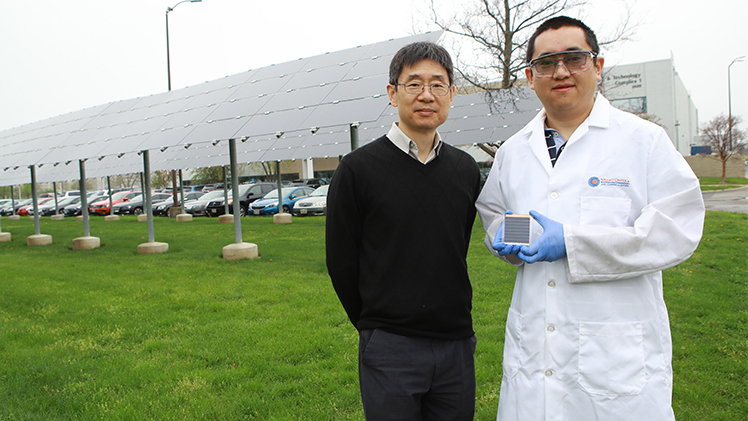Hydrogen is often hyped as a key energy source for a zero-emissions future, but the vast majority of hydrogen produced in the United States right now comes from natural gas.
Researchers at The University of Toledo are determined to change that, relying instead on the power of the sun.

The U.S. Department of Energy recently awarded Dr. Yanfa Yan, a Distinguished University Professor of physics, and Dr. Zhaoning Song, a research assistant professor in the UToledo Department of Physics and Astronomy, a $1 million grant for continued research into solar cells producing clean hydrogen.
Dr. Yanfa Yan, a Distinguished University Professor of physics, and Dr. Zhaoning Song, a research assistant professor in the UToledo Department of Physics and Astronomy, have spent years developing highly efficient perovskite solar cells.
In addition to its potential for producing inexpensive electricity, perovskite is being studied by Yan and Song as a low-cost way to break apart water molecules, separating hydrogen from oxygen.
“This is considered the holy grail for hydrogen production,” Yan said. “We’re using abundant sunlight and abundant water to generate renewable hydrogen. It is the ultimate way to provide clean energy.”
The U.S. Department of Energy recently awarded UToledo a $1 million grant to continue that research as part of a $42 million round of funding to advance critical technologies for producing, storing and deploying clean hydrogen.
“This award will further the development of advanced solar water splitting technology to scale up production of renewable hydrogen fuel,” said U.S. Rep Marcy Kaptur, ranking member of the House Appropriations Subcommittee on Energy and Water Development. “I am proud to see The University of Toledo continue the Glass City’s tradition of industry-leading, cutting-edge solar technology innovation. Bringing these advanced materials to market will foster greater growth of domestic supply chains for next-generation energy production and will provide good paying jobs for future generations of American workers to come, in northwest Ohio and across our nation.”
The funding is Yan’s second grant from the Department of Energy’s Hydrogen and Fuel Cell Technologies Office in recent years. He was awarded $750,000 for a similar project in 2019.
Hydrogen is currently used for a number of industrial purposes, including fertilizer production and lowering the sulfur content of diesel fuel. But its potential as a fuel source — be it in automobiles, rockets or powering the electrical grid — has yet to be fully realized, Yan said.
“Hydrogen has no toxic byproduct,” he said. “If we can produce it cheaply from renewable sources, it can be an extremely important part of our future as we look to climate and emissions goals.”
The Biden administration has set a goal of having a 100% clean electrical grid by 2035 and net-zero carbon emissions by 2050.
Yan and Song already have shown the feasibility of their system. With the new funding, they’ll look to make it more efficient, more stable and more affordable.
“We’ve demonstrated this inside and in simulators, but we haven’t done it outside under real-world conditions,” Song said. “That’s one goal of this project.”
Ultimately, the aim of their research is to hit the Department of Energy’s goal of reducing the cost of clean hydrogen by 80% to $1 per kilogram by 2031.
UToledo will provide an additional $250,000 to the project, for a total investment of $1.25 million.